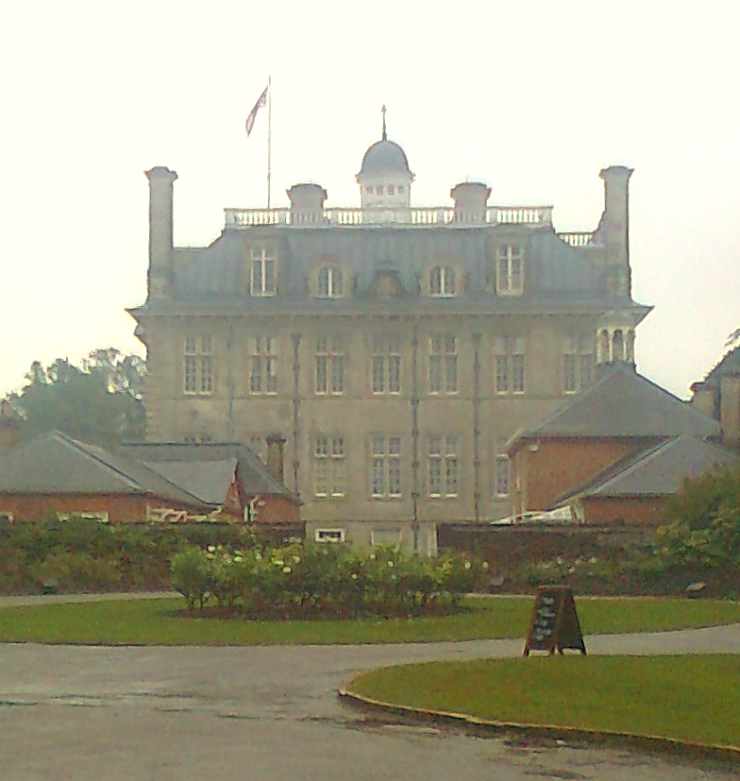Kingston Lacy House, Dorset
Like Coombe Abbey, it has facades in different styles, as one side of the original Restoration building was given a more Palladian look in the following century. Both are strikingly handsome and the house contains a substantial art collection amassed by its owners over generations.
Prominent in the entrance hall is this bronze statue of Charles I. As the Bankes family were building their new house after the Restoration, it was appropriate to pay homage to the martyred king, who displayed the Stuart genius for being deposed and beheaded.

After his death in 1644 during the Civil War, she was left in charge of Corfe Castle, and held out bravely against Parliamentarian attacks for more than two years until the castle was eventually blown up in 1646. The statue shows her holding its key.
In houses like this, the greatest pleasure is often in our sense of space and form, a harmony created by geometry, proportion and perspective.
The paintings in the house include many Spanish masterpieces and a set of four Breugels depicting the four Aristotelian elements.
The library has a large collection of leather-bound books which I would love to have investigated more closely. But they keep it very dark so that it is difficult to take decent photographs, not at least without using flash. This four-poster looks 17th-century rather than Georgian.
The website tells us that this is a "Venetian palace in the Dorset countryside" but to my mind, the house with its Italianate architecture, statues and paintings, has rather more resemblance to a baroque building in Rome or Naples in its scale, its atmosphere and grandeur. It could be the palace of a cardinal. I would not have been surprised to learn that that Bankes family were Roman Catholic. Actually as far as is known they were not. The founder of the family, Sir John Bankes, was loyal to King Charles I but never embraced the religion of his wife, Henrietta Maria. Sir John made his money as a lawyer, judge and attorney-general and used it to buy the first Bankes estate in Dorset. Each generation sent its sons on extended Grand Tours of Europe and this nurtured their passion for all things continental.

Nearby is a statue of Dame Mary Bankes wife of Sir John. Mary Bankes bore her husband ten children yet also found the time and energy to do much more as well.
The same statue from another angle. This is a work of art that celebrates a woman's toughness and determination in a time of war, and her ability to assume a position of leadership.
Looking out through the archways into the garden gives us a sense of glimpsing something very
enticing, although it may be a rainy day and the view misty and wan.
All the principal rooms are situated on the first floor. They all had a makeover in 1791 and are Georgian in style. A grand ball was held to show the new interior to guests.
The ballroom.
Later generations made further drastic alterations and an organ in the dining-room is one of the house's greatest oddities.
Among all the portraits in the house, this one particularly caught my eye. It is a double portrait of the two illustrious Palatine Princes, Rupert and Maurice, who fought for their uncle in the Civil War.
The library has a large collection of leather-bound books which I would love to have investigated more closely. But they keep it very dark so that it is difficult to take decent photographs, not at least without using flash. This four-poster looks 17th-century rather than Georgian.
How much longer will we, the public, be able to visit National Trust houses like Kingston Lacy for the price of a restaurant meal, and enjoy masterpieces of architecture, art and landscape gardening or as some would call it the "outdated mansion experience" ?
If the likes of Tony Berry get his way, not for very long. We may soon find that they have been "re-purposed", the contents put into storage and the premises rented out for use as hotels or conference centres. The landscaped grounds will be turned into golf courses or theme parks and the books probably thrown on a skip.
https://landedfamilies.blogspot.com/2018/12/356-bankes-of-kingston-lacy.html
















Comments
Post a Comment